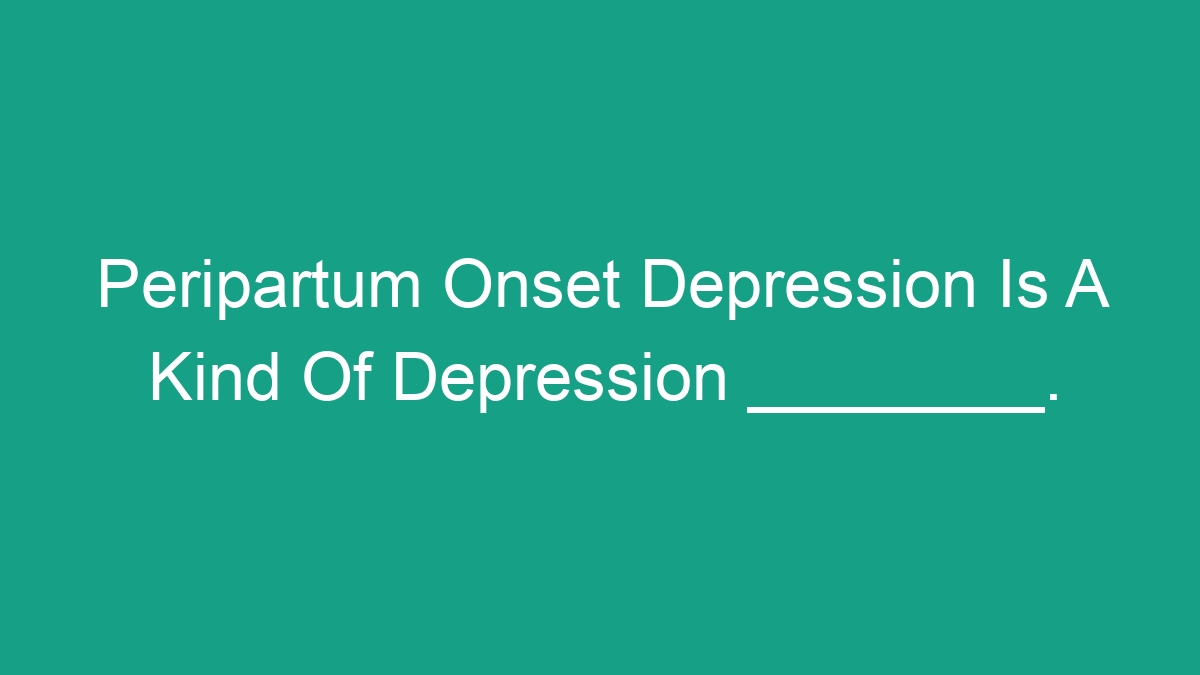
When it comes to mental health, depression is a term that we often hear. Many people are familiar with the concept of depression, but not everyone may be aware of a specific type known as peripartum onset depression. This type of depression occurs during pregnancy or after giving birth, and it is important to understand its symptoms, risk factors, and treatment options.
What Is Peripartum Onset Depression?
Peripartum onset depression is a type of mood disorder that affects women during pregnancy or up to a year after giving birth. It is often referred to as perinatal depression or postpartum depression, and it can have a significant impact on a woman’s emotional well-being and daily functioning. This type of depression is more than just the “baby blues” that many women experience after childbirth, as it is characterized by more intense and persistent symptoms.
Symptoms of Peripartum Onset Depression
It’s important to recognize the symptoms of peripartum onset depression so that appropriate support and treatment can be sought. Some common symptoms include:
- Feelings of sadness, hopelessness, or emptiness
- Loss of interest in activities
- Changes in appetite or weight
- Difficulty sleeping or sleeping too much
- Feelings of guilt or worthlessness
- Loss of energy or fatigue
- Difficulty concentrating or making decisions
- Thoughts of death or suicide
If these symptoms are interfering with your ability to function in your daily life or care for yourself and your baby, it’s essential to seek help from a healthcare professional.
Risk Factors for Peripartum Onset Depression
While any woman can experience peripartum onset depression, certain factors may increase the risk. These risk factors include:
- Personal or family history of depression
- Stressful life events
- Unplanned or unwanted pregnancy
- Lack of social support
- Financial difficulties
- Complications during pregnancy or childbirth
- History of trauma or abuse
Identifying these risk factors can help healthcare providers offer early support and intervention to women who may be at higher risk for peripartum onset depression.
Treatment Options for Peripartum Onset Depression
There are several treatment options available for peripartum onset depression, and the most suitable approach will depend on the severity of symptoms and individual needs. Treatment options may include:
- Psychotherapy: This can include individual counseling or support groups to help women manage their symptoms and cope with the challenges of peripartum onset depression.
- Medication: In some cases, healthcare providers may prescribe antidepressant medications to help manage symptoms. It’s essential to discuss the potential risks and benefits of medication during pregnancy and while breastfeeding.
- Support from loved ones: Having a strong support system of family and friends can make a significant difference in managing peripartum onset depression.
- Self-care: Engaging in self-care activities, such as exercise, relaxation techniques, and proper nutrition, can also contribute to managing symptoms.
It’s important for women experiencing peripartum onset depression to work closely with their healthcare providers to determine the most effective treatment plan for their individual needs.
The Importance of Seeking Help
Peripartum onset depression is a legitimate and treatable condition, and seeking help is vital for the well-being of both the mother and the baby. If left untreated, peripartum onset depression can have long-lasting effects on a woman’s mental health, as well as impact her ability to bond with and care for her baby.
It’s crucial for women to feel comfortable discussing their feelings and seeking support from healthcare professionals, family members, and friends. By addressing peripartum onset depression early on, women can receive the necessary help to improve their mental and emotional well-being.
Final Thoughts
Understanding peripartum onset depression is key to addressing and managing this type of depression effectively. It’s essential for women, their loved ones, and healthcare providers to be aware of the symptoms, risk factors, and treatment options available.
By taking a proactive approach to mental health during and after pregnancy, women can receive the support they need to navigate peripartum onset depression and ultimately improve their overall well-being.
If you or someone you know is experiencing symptoms of peripartum onset depression, don’t hesitate to reach out for help. You are not alone, and there are resources and support available to assist you through this challenging time.



